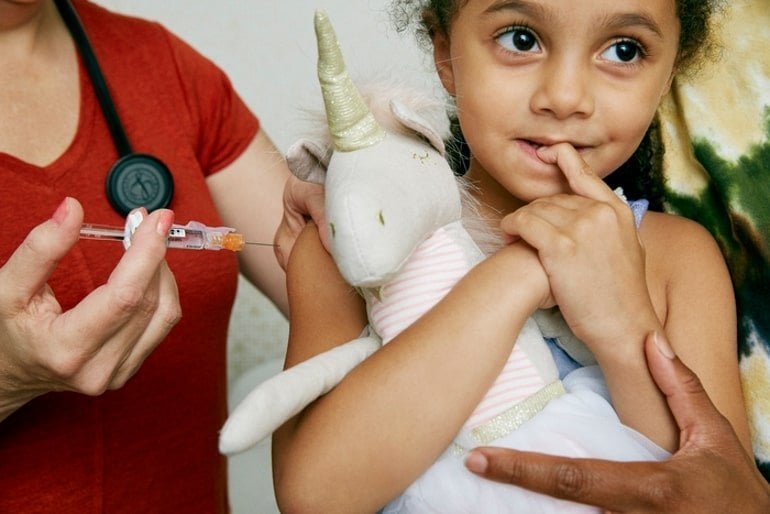Summary: A child’s vaccination or needle fear can be reduced if the nurse spends additional time supporting children during the vaccination process.
Source: University of South Australia
Tears, tantrums, and distress – when it comes to needles, many children struggle with anxiety. But with vaccinations becoming more regular, finding ways to help reduce needle-related fear and pain is high on the agenda.
Now, new research from the University of South Australia shows that children’s vaccination and needle fear can be lessened when nurses spend additional time supporting children in the vaccination process.
Working with children aged 8-12 years, the preliminary study found that two new nurse-led techniques show promise in reducing needle fear in primary-aged children:
- Divided Attention – where a child’s attention and expectations are drawn away from the needle.
- Positive Memory Reframing – where a child’s exaggerations about the distress and discomfort of needles are redressed through discussion about the positive elements of the experience so that the form more realistic memories of the event.
Lead researcher, UniSA’s Dr Felicity Braithwaite, says helping children reduce fear and distress around vaccinations is a critical research priority given the current COVID-19 pandemic.
“For many children, undergoing a needle procedure can be painful and distressing,” Dr Braithwaite says.
“Negative experiences of vaccinations in childhood can often lead to medical avoidance and vaccine hesitancy into adulthood, which can have devastating consequences when it comes to outbreaks of preventable diseases.
“By investing more time into techniques to help children manage their fears about needles, we hope to change these outcomes and deliver better health outcomes for the next generation.”

The study involved 41 children and their parents, with participants randomly allocated to one of four groups – usual care, divided attention, positive memory reframing, or a combination of the latter two interventions. Clinical outcomes were assessed at baseline, immediately post-vaccination and at two-weeks post-vaccination.
The Divided Attention technique involved a one-two minute distraction game where a nurse tapped the child’s arm above and below the vaccination spot in a random order, with the child focussing their attention on guessing which spot was touched each time. This game takes advantage of the potential analgesic effects of distraction.
The Positive Memory Reframing technique involved talking to children about a past injection and emphasising positive aspects, such as how brave the child was and praising specific strategies they used to reduce their own distress, for example, deep breathing and looking away. The aim is to foster a sense of self-efficacy to help children better cope.
Both strategies were tested in non-clinical settings (such as schools) to maximise the potential of broad vaccination programs that deliver minimal distress for children.
About this psychology and anxiety research news
Author: Annabel Mansfield
Source: University of South Australia
Contact: Annabel Mansfield – University of South Australia
Image: “Young girl about to receive a vaccine from a medical professional” by SELF Magazine is licensed under CC BY 2.0.
Original Research: Open access.
“Reframe the pain: Divided attention and positive memory reframing to reduce needle pain and distress in children— A feasibility randomized controlled trial” by Felicity Braithwaite et al. European Journal of Pain
Abstract
Reframe the pain: Divided attention and positive memory reframing to reduce needle pain and distress in children— A feasibility randomized controlled trial
Background
Negative experiences of needle procedures in childhood can lead to medical avoidance and vaccine hesitancy into adulthood. We evaluated the feasibility of two new interventions provided by clinical nurses to reduce the negative impact of vaccinations: divided attention (DA) and positive memory reframing (PMR).
Methods
Children (8–12 years) were randomized into four groups: usual care (UC), DA, PMR or combined (DA + PMR). To evaluate feasibility, we undertook in-depth analysis of video-recorded interventions, nurse experiences (phone interviews) and child/parent memory recall of interventions (phone interviews at 2 weeks post-vaccination). Key clinical outcomes included child and parent ratings of needle-related pain intensity and fear assessed at baseline, immediately post-vaccination and 2 weeks post-vaccination (recalled).
Results
A total of 54 child–parent dyads were screened, with 41 included (10/group, except PMR [n = 11]). The interventions were not always completed as intended: 10%–22% of participants received complete interventions and two had adverse events related to protocol breach. Preliminary within-group analyses showed no effects on child/parent pain ratings. However, children in DA + PMR had reduced recalled fear (p = 0.008), and PMR (p = 0.025) and DA + PMR (p = 0.003) had reduced fear of future needles. Parent ratings of child fear were also reduced immediately post-vaccination for UC (p = 0.035) and PMR (p = 0.035).
Conclusions
The interventions were feasible, although enhanced nurse training is required to improve fidelity. Preliminary clinical results appear promising, particularly for reducing needle-related fear. Protocol registration: Protocol number ACTRN12618000687291 at ANZCTR.org.au






